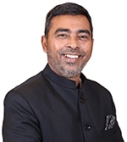
by Shah J. Choudhury
Recently, the President of Israel made remarks regarding New York City’s upcoming mayoral election. While at first glance this might appear to be a benign expression of interest, to me—and perhaps to many New Yorkers—it felt not just unnecessary, but borderline absurd.
New York City is not just a metropolis; it’s a mosaic of cultures, identities, and struggles. Our local politics reflect the real-life challenges faced by millions of working-class people, immigrants, youth, and marginalized communities. The mayoral election is not a geopolitical forum. It is a civic process rooted in local realities, not in international diplomacy or foreign policy maneuvering.
For a foreign head of state to voice opinions or express enthusiasm about the political trajectory of our city is not only irrelevant—it’s also diplomatically inappropriate. It breaches the unspoken line between global courtesy and local sovereignty. One cannot help but question the motive behind such curiosity: Is it an attempt to endorse a certain narrative? Is it about extending influence? Or is it, perhaps, a carefully masked political gesture dressed in polite words?
Let’s be clear—New Yorkers are not waiting for international applause or foreign input to decide who will lead their city. Our political future will be determined by our lived experiences, our voices, and our votes—not by outside spectators, however powerful or well-meaning they may appear.
The irony is difficult to ignore. A head of state who faces global criticism for his country’s own internal policies—on democracy, on human rights, on peace—choosing to weigh in on the democratic affairs of another region is not just misplaced, it’s almost theatrical.
At best, it’s laughable. At worst, it’s intrusive.
New Yorkers know their city. We know who listens to us, who walks with us, and who truly stands with us. The mayor we elect will reflect our dreams and frustrations, not someone else’s geopolitical interests.
So yes, I found the Israeli President’s “curiosity” to be more of a comedy than a concern. What we ask for is not curiosity, but respect. Not guidance, but trust. Not commentary, but space to determine our own democratic path.
Let us choose for ourselves—because this is our city, our struggle, our vote.







